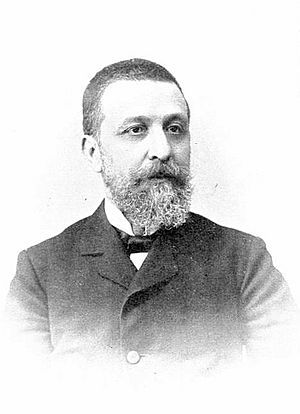Joan Alcover facts for kids
Quick facts for kids
Joan Alcover
|
|
|---|---|
 |
|
| Born | Joan Alcover i Maspons 3 May 1854 Palma de Mallorca, Spain |
| Died | 25 February 1926 (aged 71) Palma de Mallorca, Spain |
| Occupation | Lawyer, politician, poet |
| Language | Catalan and Spanish |
| Nationality | Spanish |
| Notable works | La Balanguera (Mallorca Hymn) |
| Notable awards | Floral Games |
| Spouse | Rosa Pujol Guarch Maria del Haro Rosselló |
| Children | Pere, Teresa, Gaietà Maria, Pau |
Joan Alcover i Maspons (Catalan pronunciation: [ʒuˈan əlkuˈve]) was an important Spanish writer, poet, and politician from the Balearic Islands. He lived from 1854 to 1926. He is best known for his poetry, especially the poem La Balanguera, which became the official anthem of Majorca.
Contents
Early Life and Career
Joan Alcover grew up in an important family in Palma de Mallorca. He studied law in Barcelona and became a lawyer in 1878. After finishing his studies, he returned to Majorca. There, he worked in different legal jobs.
At the same time, Joan Alcover became involved in politics. He joined the liberal party of his friend Antoni Maura. His political career grew, and in 1893, he became a representative in the 'Corts' (the Spanish Parliament). After a short time in Madrid, he went back home to the Balearic Islands and stopped his political activities.
A Passion for Writing
From a young age, Joan loved to write. When he was just 18, he published his poems in both Catalan and Spanish. These poems appeared in magazines like 'El Isleño' and 'Museo Balear'.
His interest in writing grew even stronger while he was studying in Barcelona. He learned about the 'Renaixença' movement, which was a cultural revival in Catalonia. He took part in literary events, contests, and readings. When he was 23, he won a special prize at the Barcelona Floral Games, which were poetry competitions.
Changing Languages
Joan Alcover became a well-known poet. He used his writing skills to gain respect in society. His home became a meeting place for important thinkers from Majorca.
At first, he started writing more in Spanish than in Catalan. His early poetry books, like 'Poesías' (1887) and 'Nuevas poesías' (1892), included some Catalan poems. However, his later books, 'Poemas y armonías' (1894) and 'Meteoros' (1901), were entirely in Spanish. His early poems were inspired by the Romantic style, similar to other poets of his time. Critics liked his books, and he became recognized in official cultural groups.
Facing Hardship
Joan Alcover faced many sad events in his life. In 1887, just six years after getting married, he lost his first wife, Rosa Pujol Guarch. They had three children together: Pere, Teresa, and Gaietà.
In 1891, he married Maria del Haro Rosselló, and they had two more children, Maria and Pau. Sadly, only Pau outlived him. In 1901, Teresa died from tuberculosis. In 1905, Pere died from typhoid. Then, in 1919, both Maria and Gaietà died on the same day. These difficult times deeply affected him. They also made him think more deeply about life and art.
Return to Catalan Poetry
Because of his personal struggles, Joan Alcover's poetry began to change. He started to think about which language to write in. Between 1899 and 1903, he decided to write mainly in Catalan again.
At this time, Majorca was also changing. Romantic literature was becoming less popular, and the island was modernizing. There were stronger cultural connections with Catalonia, and political Catalanism was growing. All these changes encouraged him to explore new ideas in literature. He became friends with famous artists like Santiago Rusiñol and Josep Carner. This helped him connect with the wider cultural scene in Catalonia. He began to believe that poetry should not just be for fun, but should also have a purpose and connect with society.
Ideas on Art
In 1904, Joan Alcover gave a famous talk in Barcelona called ‘Humanització de l’art’ (Humanizing of art). In this talk, he shared his most important ideas about writing poetry. He believed that a poet's feelings should be shown clearly and beautifully in their poems. He didn't like poetry that was too intellectual or based on tricks.
He wanted poetry to be connected to real life experiences. He felt it should deeply connect with the reader's human feelings. He aimed for a style that was both natural and well-crafted.
Famous Works
His book 'Cap al tard' (When it is getting late), published in 1909, is a great example of his ideas. This book was written entirely in Catalan. It contains many poems that describe Majorcan landscapes. These poems express different feelings and emotions, as well as the poet's own ideas about art.
One famous poem from this collection is ‘Balanguera’. It uses ideas from popular stories and was later set to music by Amadeu Vives. Today, it is the official anthem of Majorca. The section called ‘Elegies’ (Elegies) is also very powerful. In these poems, he writes about the pain he felt as a father who lost his children. However, he turns his personal sadness into feelings that everyone can understand.
His last book of poems was ‘Poemes bíblics’ (Biblical poems), published in 1918. In this book, he used characters and stories from the Bible.
Recognition and Legacy
Many writers of his time, especially those from the 'escola mallorquina' (Majorcan School), admired Joan Alcover. He was recognized for his important contributions to literature.
He became a member of the 'Acadèmia de Bones Lletres' (Academy of Good Letters) in 1913. In 1916, he was the President of the Barcelona 'Jocs Florals' (Floral Games). He also became a member of the 'Institut d'Estudis Catalans' (Institute of Catalan Studies) in 1916.
See also
 In Spanish: Joan Alcover para niños
In Spanish: Joan Alcover para niños
 | Selma Burke |
 | Pauline Powell Burns |
 | Frederick J. Brown |
 | Robert Blackburn |

